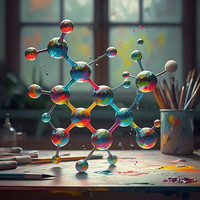THCA vs DELTA9 THC.
Posted by CHEAPTHCA on May 10th 2025
Let’s start with definitions. Delta-9 THC (Tetrahydrocannabinol) is the primary psychoactive compound in cannabis, responsible for the “high” associated with marijuana use. It interacts with the body’s endocannabinoid system, specifically binding to CB1 receptors in the brain, which alters perception, mood, and cognition. Delta-9 THC is found in mature cannabis plants, particularly after the plant has been heated or dried, and is a controlled substance under federal law due to its psychoactive effects. In contrast, THCA (Tetrahydrocannabinolic Acid) is a non-psychoactive cannabinoid present in raw, unprocessed cannabis and hemp plants. It doesn’t produce a high, making it a popular choice for those seeking cannabis benefits without intoxication. However, when THCA is exposed to heat through a process called decarboxylation—such as smoking, vaping, or cooking—it loses its carboxyl group and transforms into Delta-9 THC. This conversion is why raw cannabis won’t produce a high, but heated cannabis will. For example, a fresh cannabis flower might contain high levels of THCA, but once it’s smoked, that THCA becomes Delta-9 THC, delivering psychoactive effects.
Another key difference is their legal status. Under the 2018 Farm Bill, THCA is federally legal when derived from hemp with no more than 0.3% Delta-9 THC on a dry weight basis. Since THCA is non-psychoactive and not listed as a controlled substance, it’s widely available in hemp-derived products like raw flower or tinctures. On the other hand, Delta-9 THC is classified as a Schedule I controlled substance under the Controlled Substances Act, making it federally illegal outside of states with legalized recreational or medical marijuana programs. This legal distinction makes THCA a more accessible option for consumers in restrictive regions.
Despite these differences, Delta-9 THC and THCA are strikingly similar at a chemical level. THCA is the acidic precursor to Delta-9 THC, meaning they share nearly identical molecular structures. The primary difference is the presence of a carboxyl group (COOH) in THCA, which is removed during decarboxylation to form Delta-9 THC. This structural similarity is why THCA can so easily convert into Delta-9 THC with heat or time.
In Short, non physcoactive THCA turns into physcoactive DELTA9 THCA when heated.

